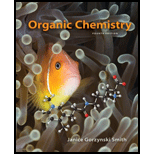
(a)
Interpretation: The product of the given reductive amination reaction is to be drawn.
Concept introduction:
(b)
Interpretation: The product of the given reductive amination reaction is to be drawn.
Concept introduction: Amines are the derivatives of ammonia consisting of a nitrogen atom with the lone pair of electrons. They are basic compounds. Reductive amination comprises transformation of the carbonyl group of ketone or aldehyde to an imine intermediate, which leads to the formation of an amine. The synthesis of the products relies upon the type of reactants and reagents that are used during the reactions. The reagents perform numerous functions in reactions like proton abstraction, oxidation.
(c)
Interpretation: The product of the given reductive amination reaction is to be drawn.
Concept introduction: Amines are the derivatives of ammonia consisting of a nitrogen atom with the lone pair of electrons. They are basic compounds. Reductive amination comprises transformation of the carbonyl group of ketone or aldehyde to an imine intermediate, which leads to the formation of an amine. The synthesis of the products relies upon the type of reactants and reagents that are used during the reactions. The reagents perform numerous functions in reactions like proton abstraction, oxidation.
(d)
Interpretation: The product of the given reductive amination reaction is to be drawn.
Concept introduction: Amines are the derivatives of ammonia consisting of a nitrogen atom with the lone pair of electrons. They are basic compounds. Reductive amination comprises transformation of the carbonyl group of keto acids to an imine intermediate, which leads to the formation of an amine. The synthesis of the products relies upon the type of reactants and reagents that are used during the reactions. The reagents perform numerous functions in reactions like proton abstraction, oxidation, reduction, catalysis, and dehydrogenation.
Want to see the full answer?
Check out a sample textbook solution
Chapter 25 Solutions
Connect Access Card For Organic Chemistry
- Draw a stepwise mechanism for the following Friedel–Crafts acylation.arrow_forwardDraw a stepwise mechanism for the sulfonation of an alkyl benzene such as A to form asubstituted benzenesulfonic acid B. Treatment of B with base forms a sodium salt C that canbe used as a synthetic detergent to clean away dirt.arrow_forwardDraw a stepwise mechanism for the following reaction:arrow_forward
 ChemistryChemistryISBN:9781305957404Author:Steven S. Zumdahl, Susan A. Zumdahl, Donald J. DeCostePublisher:Cengage Learning
ChemistryChemistryISBN:9781305957404Author:Steven S. Zumdahl, Susan A. Zumdahl, Donald J. DeCostePublisher:Cengage Learning ChemistryChemistryISBN:9781259911156Author:Raymond Chang Dr., Jason Overby ProfessorPublisher:McGraw-Hill Education
ChemistryChemistryISBN:9781259911156Author:Raymond Chang Dr., Jason Overby ProfessorPublisher:McGraw-Hill Education Principles of Instrumental AnalysisChemistryISBN:9781305577213Author:Douglas A. Skoog, F. James Holler, Stanley R. CrouchPublisher:Cengage Learning
Principles of Instrumental AnalysisChemistryISBN:9781305577213Author:Douglas A. Skoog, F. James Holler, Stanley R. CrouchPublisher:Cengage Learning Organic ChemistryChemistryISBN:9780078021558Author:Janice Gorzynski Smith Dr.Publisher:McGraw-Hill Education
Organic ChemistryChemistryISBN:9780078021558Author:Janice Gorzynski Smith Dr.Publisher:McGraw-Hill Education Chemistry: Principles and ReactionsChemistryISBN:9781305079373Author:William L. Masterton, Cecile N. HurleyPublisher:Cengage Learning
Chemistry: Principles and ReactionsChemistryISBN:9781305079373Author:William L. Masterton, Cecile N. HurleyPublisher:Cengage Learning Elementary Principles of Chemical Processes, Bind...ChemistryISBN:9781118431221Author:Richard M. Felder, Ronald W. Rousseau, Lisa G. BullardPublisher:WILEY
Elementary Principles of Chemical Processes, Bind...ChemistryISBN:9781118431221Author:Richard M. Felder, Ronald W. Rousseau, Lisa G. BullardPublisher:WILEY





